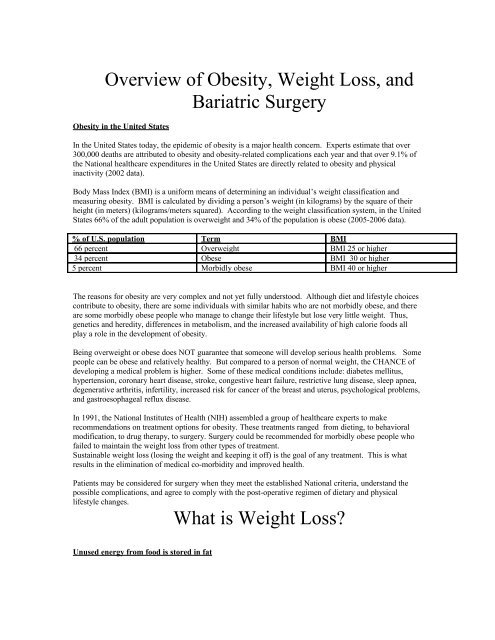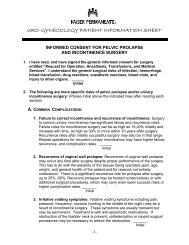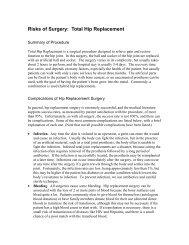Patient Information Book For Gastric Bypass Surgery - permanente.net
Patient Information Book For Gastric Bypass Surgery - permanente.net
Patient Information Book For Gastric Bypass Surgery - permanente.net
You also want an ePaper? Increase the reach of your titles
YUMPU automatically turns print PDFs into web optimized ePapers that Google loves.
Overview of Obesity, Weight Loss, and<br />
Bariatric <strong>Surgery</strong><br />
Obesity in the United States<br />
In the United States today, the epidemic of obesity is a major health concern. Experts estimate that over<br />
300,000 deaths are attributed to obesity and obesity-related complications each year and that over 9.1% of<br />
the National healthcare expenditures in the United States are directly related to obesity and physical<br />
inactivity (2002 data).<br />
Body Mass Index (BMI) is a uniform means of determining an individual’s weight classification and<br />
measuring obesity. BMI is calculated by dividing a person’s weight (in kilograms) by the square of their<br />
height (in meters) (kilograms/meters squared). According to the weight classification system, in the United<br />
States 66% of the adult population is overweight and 34% of the population is obese (2005-2006 data).<br />
% of U.S. population Term BMI<br />
66 percent Overweight BMI 25 or higher<br />
34 percent Obese BMI 30 or higher<br />
5 percent Morbidly obese BMI 40 or higher<br />
The reasons for obesity are very complex and not yet fully understood. Although diet and lifestyle choices<br />
contribute to obesity, there are some individuals with similar habits who are not morbidly obese, and there<br />
are some morbidly obese people who manage to change their lifestyle but lose very little weight. Thus,<br />
ge<strong>net</strong>ics and heredity, differences in metabolism, and the increased availability of high calorie foods all<br />
play a role in the development of obesity.<br />
Being overweight or obese does NOT guarantee that someone will develop serious health problems. Some<br />
people can be obese and relatively healthy. But compared to a person of normal weight, the CHANCE of<br />
developing a medical problem is higher. Some of these medical conditions include: diabetes mellitus,<br />
hypertension, coronary heart disease, stroke, congestive heart failure, restrictive lung disease, sleep apnea,<br />
degenerative arthritis, infertility, increased risk for cancer of the breast and uterus, psychological problems,<br />
and gastroesophageal reflux disease.<br />
In 1991, the National Institutes of Health (NIH) assembled a group of healthcare experts to make<br />
recommendations on treatment options for obesity. These treatments ranged from dieting, to behavioral<br />
modification, to drug therapy, to surgery. <strong>Surgery</strong> could be recommended for morbidly obese people who<br />
failed to maintain the weight loss from other types of treatment.<br />
Sustainable weight loss (losing the weight and keeping it off) is the goal of any treatment. This is what<br />
results in the elimination of medical co-morbidity and improved health.<br />
<strong>Patient</strong>s may be considered for surgery when they meet the established National criteria, understand the<br />
possible complications, and agree to comply with the post-operative regimen of dietary and physical<br />
lifestyle changes.<br />
What is Weight Loss?<br />
Unused energy from food is stored in fat
















